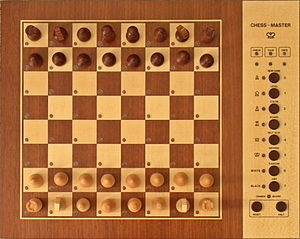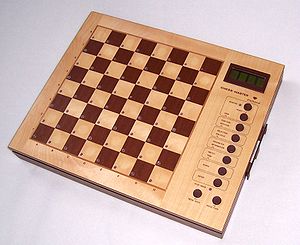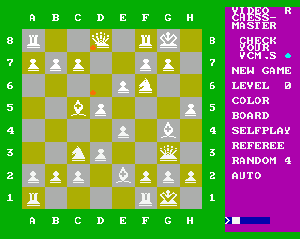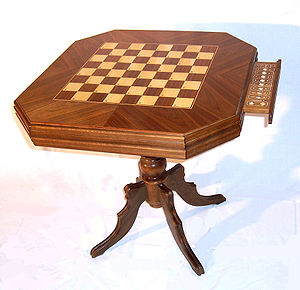Chess-Master

Chess-Master,
a dedicated chess computer series manufactured in the 80s by VEB Mikroelektronik „Karl Marx“ Erfurt, East Germany, in West Germany sold by Radiophon. Chess-Master ran on an 8-bit U880 CPU, which was an unlicensed Z80 clone, and had 10 KB ROM and 2 KB RAM. The chess program was initially written by Dieter Schultze and Rüdiger Worbs.
Automatic piece recognition was implemented with Hall effect sensors under each square of the chessboard, while pieces had two reverse directed permanent magnets with different compensation embedded, so that a cyclic running multiplexed I/O program, also polling the keyboard, could recognize the pieces [2] [3] .
Chess-Master played the 3rd World Microcomputer Chess Championship 1983 in Budapest, running on a 2.5 MHz processor, searching 12 - 15 nodes per second [4], and competed with Fidelity Sensory 9 for the title of the best commercial entry [5].
Contents
Chess-Master Table
The Chess-Master Table was a rare piece of jewelry. Only approximately 10 issues were build for special purposes - for instance, one Chess-Master Table was dedicated to Fidel Castro, a gift by Erich Honecker [8] [9] .
Chess-Master Diamond

The improved Chess-Master Diamond was contributed by Rüdiger Worbs and Wolfgang Pähtz [11] , and was released in 1987 [12] .
Video Chess-Master

The Chess-Master program was further ported to the KC 85/2 personal computer (an Amstrad CPC clone) by Wolfgang Pähtz [14].
See also
- Chessmaster
- ChessMaster aka Chess Champion Super System III
- Masters
- SC 1
- SC 2
Publications
- Dieter Schultze, Rüdiger Worbs (1986). Schachcomputer Chess-Master CM, rfe, H1, S 19-21 [15]
- Christian Posthoff, Günter Reinemann (1987). Computerschach - Schachcomputer. Berlin: Akademie-Verl., ISBN-13: 978-3055002281, with cooperation of Rainer Knaak, Michael Schlosser, Rainer Staudte, Rüdiger Worbs, available from Wernis Schachlade - Computerschach
- Rainer Hinkeldein, Rüdiger Worbs (1988). Schachcomputer Chess-Master Diamond. rfe, H5, S 316-312
- Hans-Peter Ketterling (1988). Nürnberger Messeneuheiten - VEB Mikroelektronik Erfurt - Chessmaster Diamond. Europa-Rochade 03-1988, 04-1988 [16]
- Thomas Mally (1989). Dinosaurus Hi-Tech - Chess Master “Diamond” nicht ganz Lupenrein. Modul 1/1989 [17]
- Karsten Bauermeister (1999). Deutsch-Deutsche Geschichte(n). Computerschach und Spiele. No. 5, October-November 1999, pp 32-33 (German)
External Links
- Chess-Master's ICGA Tournaments
- Rft/VEB Erfurt Chess-Master Electronic Chess Computer from The Spacious Mind
- Chess Master by Tom Luif
- Chess Master Diamond by Tom Luif
- CM, Schachcomputer in der DDR from Wikipedia.de (German)
- Chess-Master from Schachcomputer.info Wiki (German)
- Chess-Master Schachtisch from Schachcomputer.info Wiki (German)
- Chess-Master Diamond from Schachcomputer.info Wiki (German)
- Chess-Master Diamond from Kurt´s Schachcomputer Homepage by Kurt Kispert (German)
- OEM und Sonstiges - Schachcomputer "ChessMaster" from Robotron-net.de (German)
- Schachcomputer from robotrontechnik.de (German)
- Schachcomputer (DDR) by Wolfgang Pähtz
References
- ↑ East German chess computer CM (Chess-Master,) CM, Schachcomputer in der DDR from Wikipedia.de (German)
- ↑ OEM und Sonstiges - Schachcomputer "ChessMaster" from Robotron-net.de (German)
- ↑ Chess-Master circuit diagram hosted by Robotron-net.de
- ↑ Frederic Friedel (1984). Move from the East. Report of the WMCCC 1983, Personal Computer World, January 1984
- ↑ David Kittinger (1984). Report from Budapest. Computer Chess Digest Annual 1984 pp. 34
- ↑ Kombinat Mikroelektronik Erfurt (KME) from Wikimedia Commons, Photo by Erdmann Schleinitz
- ↑ Chess-Master Schachtisch from Schachcomputer.info Wiki (German)
- ↑ VEB Mikroelektronik Erfurt from Schachcomputer.info - Wiki (German)
- ↑ Karsten Bauermeister (1999). Deutsch-Deutsche Geschichte(n). Computerschach und Spiele. No. 5, October-November 1999, pp 32-33 (German)
- ↑ Kombinat Mikroelektronik Erfurt (KME) from Wikimedia Commons, Photo by Erdmann Schleinitz
- ↑ Chess-Master Diamond from Schachcomputer.info Wiki (German)
- ↑ Chess-Master Diamond from Schachcomputer.info Wiki (German)
- ↑ Der Video Chess-Master in der DDR
- ↑ Schachcomputer (DDR)
- ↑ OEM und Sonstiges - Schachcomputer "ChessMaster" from Robotron-net.de (German)
- ↑ VEB Mikroelektronik Erfurt - Chess-Master Diamond, pdf hosted by Hein Veldhuis
- ↑ VEB Mikroelektronik Erfurt - Chess-Master Diamond, pdf hosted by Hein Veldhuis
